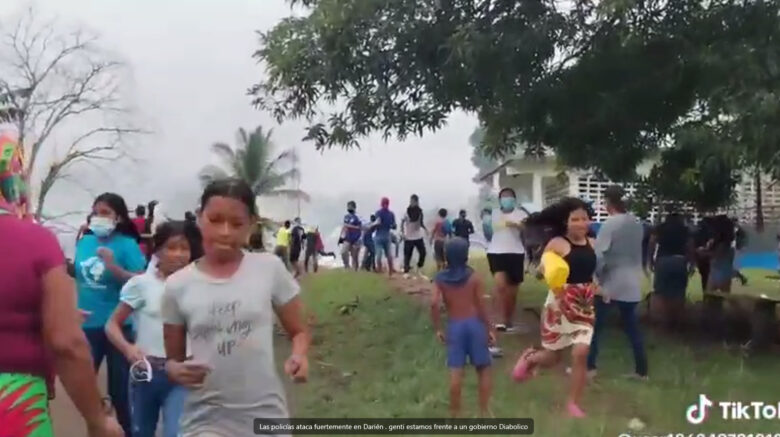June 3, 2025
Valle de Agua Arriba
Annexed area to the Ngäbe-Buglé Comarca
(Province of Bocas del Toro)
Panama
– URGENT STATEMENT –
The Movement for the Defense of Territories and Ecosystems of Bocas del Toro (MODETEAB) strongly denounces the police repression taking place in various regions of Panama. This repression has intensified in recent weeks, especially in numerous Indigenous communities, including those in the Ngäbe-Buglé and Emberá-Wounaan Comarcas.
Current Context of Social Protest in Panama
Since April 21, 2025, Panama has been experiencing massive social mobilizations. These have included strikes, marches, and demonstrations opposing the new Law 462 of the Social Security Fund, as well as the memorandum of understanding between the Panamanian and U.S. governments allowing increased U.S. military presence in the country.
Protests have also opposed the government’s intention to revive mining projects, despite the massive anti-mining demonstrations in 2023 that led the Supreme Court to declare the Cobre Panamá mining contract unconstitutional.
In response, the Panamanian government has resorted to excessive force, arbitrary detentions, and criminal proceedings against demonstrators, university professors, union leaders, and Indigenous community leaders. These actions have been widely denounced as political persecution and repression of the right to protest. The Ombudsman’s Office has opened national investigations into possible human rights violations amid the protests.
Repression Against Indigenous Communities
Within this context, several Indigenous communities have been subjected to repeated acts of violence and repression. Security forces — including the National Police and the Border Service (SENAFRONT) — have invaded Indigenous communities, repressing both demonstrators and residents. Helicopters have been used to launch tear gas in populated areas, affecting children, women, and elders. Indigenous leaders have also reported the use of firearms and home raids.
In the Ngäbe-Buglé Comarca and surrounding areas, security forces repressed peaceful protests in multiple communities. On May 13, three helicopters dropped tear gas on demonstrators in Viguí. Riot police then stormed the area, launching gas indiscriminately. Between May 14–15, police and SENAFRONT agents entered El Piro, deploying tear gas and rubber bullets, seriously injuring student Caleb Bejarano, who was hospitalized after being shot in the abdomen.
Similarly, in the Emberá-Wounaan Comarca and neighboring areas, from mid-May, security forces began repressing Indigenous communities. In Arimae, in the province of Darién, tear gas was fired into streets and homes, again affecting women, children, and elders. During these protests, between May 31 and June 1, Roben Donisabe, a 12-year-old Emberá boy, died from rubber bullet injuries, according to Indigenous leaders.
In Bocas del Toro, strikes and protests have halted transportation into and out of the province. Although Indigenous Ngäbe communities here have not yet been subjected to violence, MODETEAB expresses grave concern about the presence of hundreds of riot police. There is a real risk of disproportionate force being used against both protesters and Indigenous civilians in their homes.
This concern is rooted in historical memory: during the 2010 general strike against Law 30, security forces used violence against demonstrators, resulting in two deaths and many injuries. The current President of Panama, José Raúl Mulino Quintero, was then the Minister of Security.
Conclusion and Appeals
MODETEAB reiterates its deep concern over the current wave of repression in Panama. In particular, we strongly condemn the discrimination and violence perpetrated by Panamanian authorities against Indigenous communities in recent weeks.
We call on the Panamanian State to end this repression and cease all persecution of peaceful demonstrators.
Additionally, MODETEAB urges regional and international human rights bodies to closely monitor the situation in Indigenous communities in Panama. We invite them to conduct an official visit to investigate and monitor human rights conditions and to pressure Panamanian authorities to uphold their obligation to respect and protect human rights — including the rights to free expression, peaceful assembly, life, and physical integrity.
Signatory:
Center for International Environmental Law (CIEL)
